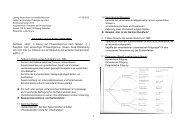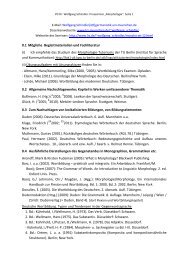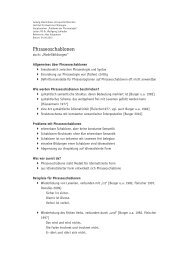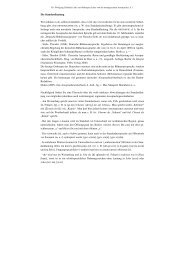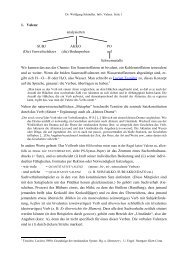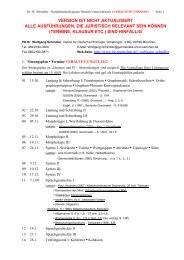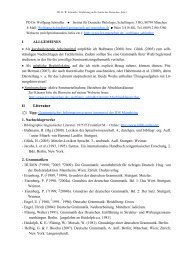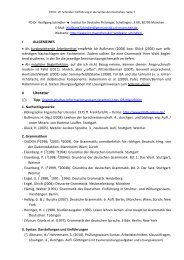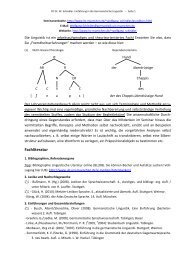Chapter 18 Lexical Functions: Description of Lexical Relations in a ...
Chapter 18 Lexical Functions: Description of Lexical Relations in a ...
Chapter 18 Lexical Functions: Description of Lexical Relations in a ...
Create successful ePaper yourself
Turn your PDF publications into a flip-book with our unique Google optimized e-Paper software.
—<strong>Chapter</strong> <strong>18</strong>. <strong>Lexical</strong> <strong>Functions</strong>— 67<br />
respectively; e.g., Adv 1IncepReal 1(L) is a DSynt-adverb mean<strong>in</strong>g (while beg<strong>in</strong>n<strong>in</strong>g to do with L<br />
what L is designed for) [ (while ...-<strong>in</strong>g) is the ‘mean<strong>in</strong>g’ <strong>of</strong> Adv 1].<br />
I have already given several examples <strong>of</strong> complex LFs; let me quote here some more<br />
Complex LFs <strong>of</strong> the same type (with the keyword <strong>in</strong> small capitals):<br />
AntiMagn : scattered APPLAUSE, weak ARGUMENTS, low TEMPERATURE, negligible LOSSES, ...<br />
AntiVer : false SHAME, a wrong CONCEPTION, unfounded SUSPICION, ...<br />
IncepOper 1<br />
CausOper 2<br />
Caus 1Oper 2<br />
AntiReal 2<br />
: acquire POPULARITY, s<strong>in</strong>k <strong>in</strong>to DESPAIR, embark upon the path <strong>of</strong> TREASON, ...<br />
: put [NY] under [NX’s] CONTROL, plunge [NX] <strong>in</strong>to SLAVERY, ...<br />
: br<strong>in</strong>g [NY] under CONTROL, put [NY] up for SALE, force [NY] <strong>in</strong>to EXILE, ...<br />
: fail an EXAMINATION, reject a PIECE OF ADVICE, turn down an APPLICATION, ...<br />
Note the crucial difference between a complex LF fg(X) and a composition (<strong>in</strong> the<br />
mathematical sense) <strong>of</strong> LFs f(g(X)): generally speak<strong>in</strong>g, fg(X) ≠ f(g(X)). Thus:<br />
Magn(applause) = thunderous, AntiMagn(applause) = scattered,<br />
but Anti(thunderous) ≠ scattered;<br />
Oper 1(despair) = be [<strong>in</strong> ~], IncepOper 1(despair) = s<strong>in</strong>k [<strong>in</strong>to ~],<br />
but Incep(be [<strong>in</strong>]) ≠ s<strong>in</strong>k; etc.<br />
A complex LF can also comb<strong>in</strong>e standard and non-standard LFs; such an LF is called<br />
mixed. For <strong>in</strong>stance:<br />
after F<strong>in</strong>Oper 1, aga<strong>in</strong> IncepOper 1(consciousness) = rega<strong>in</strong> [~]<br />
to attempt to CausFunc 0(elections) = call [ART ~]<br />
be<strong>in</strong>g too many, IncepOper 1(market) = flood [ART ~]<br />
For more examples, see 5.1.1, p. 00.<br />
4.2. Configurations <strong>of</strong> <strong>Lexical</strong> <strong>Functions</strong><br />
A configuration <strong>of</strong> LFs is a comb<strong>in</strong>ation <strong>of</strong> syntactically unrelated simple or complex<br />
LFs which have the same keyword such that there exists a s<strong>in</strong>gle lexical expression cover<strong>in</strong>g the<br />
mean<strong>in</strong>g <strong>of</strong> the comb<strong>in</strong>ation as a whole. For example:<br />
[Magn + Oper 1](laughter) = roar [with ~],<br />
where roar means ≈ (do [= Oper 1] big [= Magn] [laughter])<br />
[AntiMagn + A 2Manif](irony) = t<strong>in</strong>ged [with ~],<br />
where t<strong>in</strong>ged means ≈ (<strong>in</strong> which manifests itself [= A 2Manif] small [= AntiMagn] [irony])<br />
[tooMagn quant + IncepOper 1](market) = flood [ART ~],


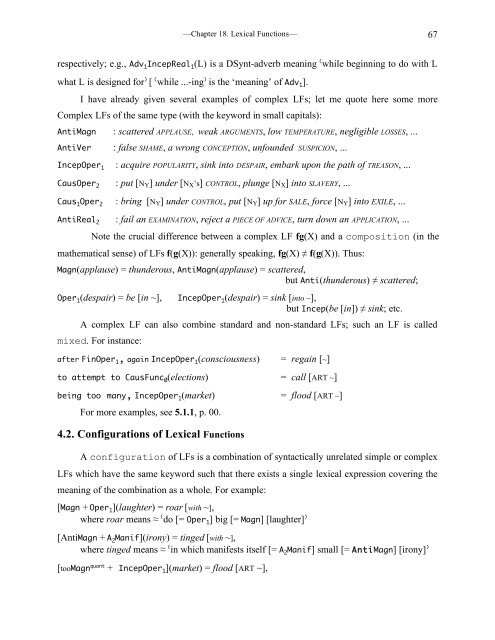
![E-Mail: Wolfgang.Schindler[ätt]germanistik.uni-muenchen.de Web ...](https://img.yumpu.com/51590147/1/184x260/e-mail-wolfgangschindlerattgermanistikuni-muenchende-web-.jpg?quality=85)
